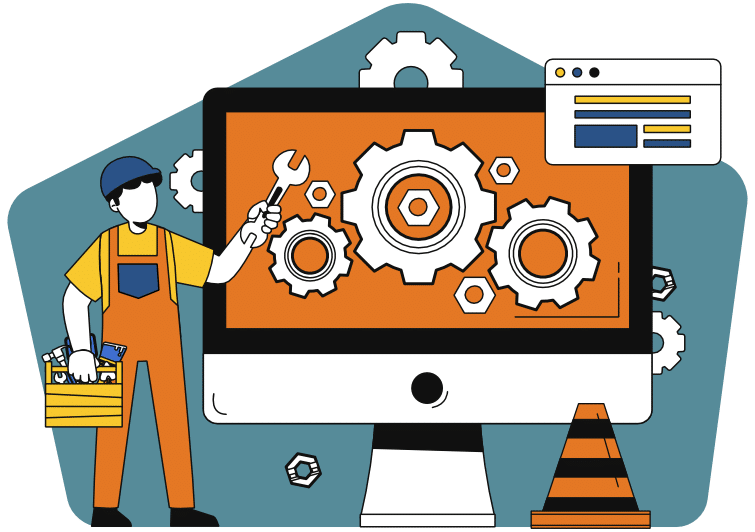In today’s highly competitive digital landscape, your website is often the first point of contact potential customers have with your business. It acts as your online storefront, a hub for your brand’s messaging, and a key component of your marketing efforts. Yet, many businesses make the mistake of thinking that once a website is up and running, their work is done. This mindset can be detrimental to long-term success. Regular website maintenance is not just a good practice—it’s essential for ensuring your website remains secure, functional, and relevant in a rapidly changing environment. In this blog post, we’ll delve into why website maintenance is crucial and how neglecting it can lead to serious consequences.
1. Security: Protecting Your Business and Customers
One of the most critical reasons for regular website maintenance is security. The internet is rife with potential threats, from hackers attempting to breach your site to malware that can compromise your data. These risks are constantly evolving, making it imperative that your website is regularly updated to defend against new vulnerabilities.
Regular Updates and Patches
Every website is built on software—whether it’s a content management system (CMS) like WordPress or a custom-built platform. These systems and their associated plugins or extensions receive regular updates that often include security patches. Ignoring these updates is akin to leaving your front door unlocked, inviting cybercriminals to exploit vulnerabilities in outdated software.
For instance, an outdated plugin can serve as a backdoor for hackers, allowing them to inject malicious code, steal data, or even take down your site entirely. Regularly updating your website ensures that you’re protected against these vulnerabilities.
SSL Certificates
In today’s digital age, SSL certificates are non-negotiable, especially for e-commerce websites or any site that handles personal information. An SSL certificate encrypts the data exchanged between your website and its users, making it harder for attackers to intercept and misuse this information. Regularly renewing your SSL certificate and ensuring it’s correctly configured is essential for maintaining trust with your customers.
In Australia, where consumers are increasingly aware of online privacy and security, an SSL certificate is not just a technical requirement—it’s a trust signal. Websites without SSL certificates may be flagged by browsers as “Not Secure,” which can deter potential customers.
Regular Backups
Despite your best efforts, no website is entirely immune to threats. This is why regular backups are a critical component of website maintenance. A backup ensures that in the event of a cyber-attack, server failure, or accidental data loss, you can quickly restore your website to its previous state. Ideally, backups should be performed automatically and stored in multiple locations to safeguard against data loss.
2. User Experience: Keeping Visitors Engaged
Your website’s user experience (UX) is crucial to its success. A website that is slow, difficult to navigate, or full of errors will drive visitors away, leading to lost business and a damaged reputation.
Performance Optimisation
As your website grows, it can accumulate unnecessary data—large images, outdated files, and unused plugins—that slow down load times. Regular maintenance involves identifying and eliminating these performance bottlenecks to ensure your website remains fast and responsive. Google research indicates that a delay of just a few seconds in page load time can significantly increase bounce rates and decrease conversions.
In Australia, where mobile internet usage is particularly high, performance optimisation is even more critical. Users expect fast, seamless experiences, whether they’re browsing on a desktop or a smartphone. Regularly optimising your site’s performance helps meet these expectations.
Mobile Responsiveness
With over 50% of global web traffic now coming from mobile devices, ensuring your website is mobile-responsive is essential. A mobile-responsive website automatically adjusts its layout and design to fit different screen sizes, providing a consistent user experience across all devices. Regular maintenance should include testing your website on various devices and browsers to ensure it remains fully functional and visually appealing.
In Australia’s mobile-centric market, a lack of mobile responsiveness can result in lost opportunities, as users quickly abandon sites that don’t perform well on their devices.
Broken Links and Errors
Broken links, 404 errors, and other technical issues can frustrate users and damage your site’s credibility. Regularly scanning your website for broken links and fixing them promptly is essential for maintaining a smooth user experience. Additionally, testing forms, scripts, and other interactive elements ensures that they function correctly and provide the intended user experience.
3. SEO: Staying Visible in Search Engines
Search engine optimisation (SEO) is not a one-time effort but an ongoing process. Regular website maintenance plays a significant role in keeping your site visible in search engine results pages (SERPs).
Content Updates
Search engines like Google favour websites that are regularly updated with fresh, relevant content. Adding new blog posts, updating existing pages, and ensuring that your content aligns with current SEO best practices can help improve your rankings. In Australia’s competitive online marketplace, staying on top of your SEO game is essential for maintaining visibility and driving traffic to your site.
Technical SEO
Technical SEO involves optimising your website’s backend to improve its crawlability and indexing by search engines. Regular maintenance tasks like updating meta tags, improving site speed, fixing broken links, and ensuring a clean site structure can positively impact your SEO. Ignoring these aspects can lead to a drop in rankings, making it harder for potential customers to find your business online.
Local SEO
For Australian businesses, local SEO is particularly important. This involves optimising your website for location-based searches, ensuring that your Google My Business listing is accurate, and maintaining consistent NAP (Name, Address, Phone number) information across the web. Regularly updating your site with localised content and keywords can help you capture more local traffic and improve your visibility in local search results.
4. Compliance: Adhering to Legal and Regulatory Requirements
In today’s digital age, compliance with legal and regulatory requirements is non-negotiable. Regular website maintenance helps ensure that your site adheres to these standards, reducing the risk of legal issues.
Privacy Laws
In Australia, businesses must comply with the Australian Privacy Principles (APPs), which govern how personal information is collected, used, and stored. Regularly reviewing your privacy policy and data collection practices to ensure compliance with these principles is essential. Failure to comply can result in significant fines and damage to your brand’s reputation.
Accessibility Standards
Web accessibility is not just a legal requirement but also a moral obligation. Your website should be accessible to all users, including those with disabilities. This includes providing alt text for images, ensuring that your site is navigable by keyboard, and using clear, readable fonts and colour contrasts. Regular maintenance should involve testing your site against accessibility guidelines to ensure it meets the necessary standards.
GDPR and International Compliance
If your business operates internationally, you may also need to comply with the General Data Protection Regulation (GDPR) and other international laws. Regular maintenance helps ensure that your site’s data collection and storage practices are compliant with these regulations, protecting your business from potential legal repercussions.
5. Brand Image: Maintaining Professionalism and Trust
Your website is often the first impression potential customers have of your business. Regular maintenance ensures that this impression is a positive one, reinforcing your brand’s professionalism and trustworthiness.
Consistent Branding
Over time, your brand’s messaging and visual identity may evolve. Regular website maintenance allows you to update your site to reflect these changes, ensuring that your branding is consistent across all platforms. This might involve updating logos, colour schemes, or the overall design of your site. Consistent branding helps build trust with your audience and reinforces your brand identity.
Professionalism
A site that is riddled with errors, broken links, or outdated information can quickly erode the trust of potential customers. Regular maintenance ensures that your site remains polished and professional, which is crucial for building and maintaining credibility. In competitive markets like Australia, where consumers have plenty of options, a well-maintained site can be a key differentiator.
User Trust
Trust is a fundamental component of customer relationships. Regularly updating your site with new content, testimonials, and case studies helps build and maintain this trust. Additionally, maintaining a secure and functional website reassures users that their data is safe and that they can rely on your business.
6. Cost Savings: Preventing Major Issues Down the Line
Regular website maintenance can save you money in the long run by preventing major issues before they arise. Just like regular maintenance on a car, a little effort and expense upfront can prevent costly repairs down the line.
Avoiding Downtime
Website downtime can be costly, both in terms of lost revenue and damage to your reputation. Regular maintenance helps identify and address issues before they escalate into major problems that could take your site offline. For e-commerce sites, even a few hours of downtime can result in significant financial losses, making maintenance a worthwhile investment.
Preventing Data Loss
Data loss can be catastrophic, particularly if it includes customer information or critical business data. Regular backups and security updates are essential for preventing data loss and ensuring that you can recover quickly in the event of an issue. The cost of losing data, both in terms of recovery and lost business, far outweighs the cost of regular maintenance.
Extending Website Lifespan
Websites, like any other technology, have a lifespan. Regular maintenance can extend this lifespan by keeping your site up-to-date with the latest technologies and best practices. This not only saves you the cost of a complete redesign but also ensures that your site remains competitive in a rapidly changing digital landscape.
7. Analytics and Insights: Leveraging Data for Business Growth
Maintaining your website also involves regularly reviewing your website analytics to understand how users are interacting with your site and where improvements can be made. This data-driven approach can help you make informed decisions that drive business growth.
Understanding User Behaviour
By regularly analysing your website’s traffic and user behaviour, you can gain insights into what is working and what isn’t. This might include identifying which pages have the highest bounce rates, which content is most popular, and where users are dropping off. Understanding these patterns allows you to make targeted improvements that enhance user experience and increase conversions.
Making Data-Driven Decisions
Website maintenance isn’t just about fixing issues; it’s also about proactively improving your site based on data. For example, if you notice that a particular page is underperforming, you might decide to rewrite the content, improve the design, or simplify the navigation. By making data-driven decisions, you can continuously optimise your website’s performance and achieve better results.
Conclusion
In today’s digital world, your website is one of your most valuable assets. However, to ensure that it continues to perform well and support your business goals, regular maintenance is essential. From security and user experience to SEO and compliance, there are numerous reasons why website maintenance should be a top priority for any business.
Neglecting maintenance can lead to a host of problems, including security breaches, poor user experience, and a decline in search engine rankings—all of which can have serious consequences for your business. On the other hand, by investing in regular website maintenance, you can protect your website, enhance its performance, and ensure that it remains a powerful tool for driving business growth.
In the competitive Australian market, where consumers have high expectations and plenty of choices, a well-maintained website can be the difference between success and failure. Don’t wait until something goes wrong—make website maintenance a part of your regular business operations and enjoy the peace of mind that comes with knowing your online presence is secure, effective, and ready to support your long-term success.
This blog post should now provide a comprehensive overview of why website maintenance is essential for the long-term success of businesses, particularly in the Australian context. Let me know if you need any further adjustments or if you would like to explore other topics!

